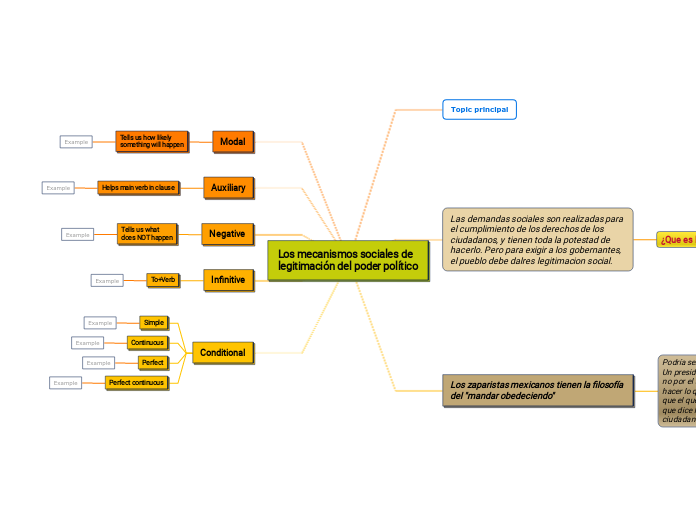Los mecanismos sociales de legitimación del poder político
As the main word in a sentence, the verb will generally describe an occurrence or an action.
Conditional
Conditional verbs are used to create conditional sentences, which express hypothetical or unlikely situations. Conditional verbs can be used in the past, present, or future tense, and auxiliary verbs like can/could, will/would, and may/might are important in forming conditionals
Perfect continuous
Perfect
Continuous
Simple
Infinitive
An infinitive verb is essentially the base form of a verb with the word 'to' in front of it. When you use an infinitive verb, the 'to' is a part of the verb. It is not acting as a preposition in this case.
To+Verb
Negative
The negative verb forms are made by putting not after an auxiliary verb.
Tells us what
does NOT happen
Auxiliary
Auxiliary verbs are verbs such as have, be, may, do, shall, will, can, or must that are used with another verb to show the verb's tense, to form a question, etc.
Helps main verb in clause
Modal
A modal verb is a type of verb that is used to indicate modality. Commonly used modal verbs are can, could, must, should, had better, have to and sometimes need or dare.
Tells us how likely
something will happen
Example
Los zaparistas mexicanos tienen la filosofía del "mandar obedeciendo"
A transitive verb will only makes sense if it applies its action on an object.
Podría ser un buen ejemplo, un presidente.
Un presidente esta a la cabeza de un país, pero no por el simple hecho de estar al frente, puede hacer lo que el quiere. Esta frase trata de decir que el que esta a la cabeza tiene que cumplir lo que dice la ley, juntamente con la opinión de los ciudadanos, tiene que velar por el bien del país.
Otro ejemplo puede ser que, el líder de un grupo de jóvenes, para tomar una decisión tiene que hablar con todos los integrantes, y pedir su opinión y así el poder tomar una decisión para el bien de todos.
Las demandas sociales son realizadas para el cumplimiento de los derechos de los ciudadanos, y tienen toda la potestad de hacerlo. Pero para exigir a los gobernantes, el pueblo debe dalres legitimacion social.
An intransitive verb has two characteristics:
1.it is an action verb, expressing a doable activity
2.it will not have a direct object receiving the action
¿Que es legitimación?
Create sentences with examples!
La legitimación es aceptar su responsabilidad o su cargo y hacer cumplir las leyes, el pueblo puede exigir, siempre y cuando sus peticiones sean conforme la ley lo permita y así quien este a cargo pueda acceder a sus peticiones.
La legitimación del poder tiene 3 fuentes:
La ley: se escoge un líder atreves de una elección popular y entonces el es quien puede hacer cumplir las leyes, porque fue escogido por los ciudadanos.
El carisma: es un atributo individual del líder, su carisma puede ayudarle a que los ciudadanos confíen en el.
La tradición: basados en la fuerza del pasado, de las costumbres.
Topic principal




